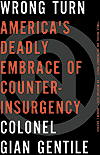
Wrong Turn: America’s Deadly Embrace of Counterinsurgency, by Colonel Gian Gentile, The New Press, New York, 2013, $24.95
The Iraq War was going badly in 2007 when President George W. Bush sent a surge of additional troops into theater and appointed General David Petraeus commander of Multi-National Force–Iraq. A major figure in establishing the U.S. Army’s new counterinsurgency doctrine, Petraeus applied it, turned matters around and placed America on the path to victory. That’s the official version, not what actually occurred, according to Colonel Gian Gentile, Iraq War veteran and professor of military history at the U.S. Military Academy at West Point, N.Y.
Counterinsurgency theory teaches that during civil disorder a tiny minority in any population supports the government, a similar minority the insurgents, and the majority remains neutral but can be won over by protecting them, solving their problems and winning their trust.
Gentile argues that counterinsurgency warfare is not new, and even if applied effectively, it’s an expensive, long-term tactic that produces more, not fewer, civilian casualties. It does have limited uses, but as a dominant strategy it leads to interminable wars—which Americans never tolerate. Counterinsurgency operations were not responsible for the diminished violence in Iraq, and few deny its receiving ineffective lip-service in Afghanistan.
Gentile makes his case in four astutely argued chapters. In everyone’s favorite insurgency, Malaya (1948–60), the British did not try to win peoples’ hearts and minds. They locked them into fortified camps, successfully isolating the guerrillas.
Despite the narrative that the United States rushed into Vietnam, guns blazing, hoping to defeat the Viet Cong with superior firepower, Gentile maintains that pacification was a goal from the start and persisted throughout the American presence. It failed because the South Vietnamese government never won its people’s trust.
Violence diminished in Iraq in 2007, says Gentile, largely because al-Qaida (not a native Iraqi movement) exasperated Sunni insurgents, who turned against it, and because Shia government and military factions decided to stop fighting each other. Now the Shia and Sunni go at it absent the United States and with al-Qaida marginalized. No one claims we have built a nation in
Iraq, which remains faction- and violence-ridden, and the subsequent much-hyped transfer of surge, counterinsurgency and Petraeus to Afghanistan has faded from the news.
Gentile insists there is less to counterinsurgency than meets the eye, except for generals and politicians anxious to explain why our recent wars have gone so badly. This remains a minority view, but (three wars and counting) it’s debatable whether reinvented armies practicing counterinsurgency under imaginative generals can rescue wars that arguably should never have been fought in the first place.
—Mike Oppenheim




